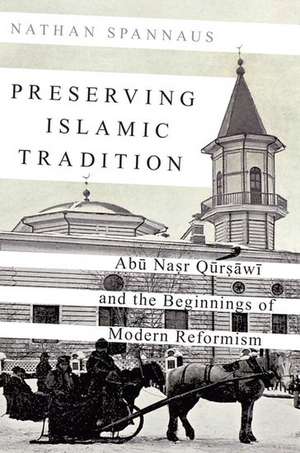Preserving Islamic Tradition: Abu Nasr Qursawi and the Beginnings of Modern Reformism
Autor Nathan Spannausen Limba Engleză Hardback – 9 sep 2019
Preț: 622.27 lei
Preț vechi: 768.23 lei
-19% Nou
Puncte Express: 933
Preț estimativ în valută:
119.07€ • 124.32$ • 98.55£
119.07€ • 124.32$ • 98.55£
Carte disponibilă
Livrare economică 15-29 martie
Preluare comenzi: 021 569.72.76
Specificații
ISBN-13: 9780190251789
ISBN-10: 0190251786
Pagini: 352
Dimensiuni: 236 x 160 x 33 mm
Greutate: 0.64 kg
Editura: Oxford University Press
Colecția OUP USA
Locul publicării:New York, United States
ISBN-10: 0190251786
Pagini: 352
Dimensiuni: 236 x 160 x 33 mm
Greutate: 0.64 kg
Editura: Oxford University Press
Colecția OUP USA
Locul publicării:New York, United States
Recenzii
I would highly recommend this book to scholars, researchers and postgraduate students working within the Islamic legal and theological tradition. Spannaus has presented Qursawi's views in a scholarly manner that critically examines key terminologies that continue to be used today within usul al-fiqh and kalam.
Preserving Islamic Tradition is a milestone in the study of the history of Islamic ideas not only in the Volga-Ural region but also the history of Islamic ideas as a whole. Nathan Spannaus has shown a new direction to the scholars of Islamic thought for future research.
In his research, Nathan Spannaus has used published and unpublished works in Arabic and Tatar and other languages. Many of these sources were unknown to western scholars of Islam. The result is a meticulously researched scholarly work. Preserving Islamic Tradition is a milestone in the study of the history of Islamic ideas not only in the Volga-Ural region but also the history of Islamic ideas as a whole. Nathan Spannaus has shown a new direction to the scholars of Islamic thought for future research.
This book is a watershed in the study of Islamic intellectual history in the Volga-Ural region. Combining several subdisciplines and primary sources in various languages that are rarely commanded by a single scholar, Spannaus is able to demonstrate how a region and a scholar positioned at various sorts of so-called peripheries -- between Europe and Islam, the pre-modern and modern, the pre-colonial and colonial -- participated in reforming and preserving the contours of the broader Islamic tradition.
Nathan Spannaus has set a new standard for how to approach Muslim scholars in the late Russian Empire. Rather than base his study on later modernist or Soviet-era interpretations of Abu Nasr Qursawi's scholarship, Spannaus has studied Qursawi's published and unpublished works in Arabic and Tatar, as well as a wide range of sources in other languages. The result is a view of Qursawi as a unique and original local voice within the diverse transregional world of post-classical Islamic thought in the eighteenth and nineteenth centuries.
Preserving Islamic Tradition is a milestone in the study of the history of Islamic ideas not only in the Volga-Ural region but also the history of Islamic ideas as a whole. Nathan Spannaus has shown a new direction to the scholars of Islamic thought for future research.
In his research, Nathan Spannaus has used published and unpublished works in Arabic and Tatar and other languages. Many of these sources were unknown to western scholars of Islam. The result is a meticulously researched scholarly work. Preserving Islamic Tradition is a milestone in the study of the history of Islamic ideas not only in the Volga-Ural region but also the history of Islamic ideas as a whole. Nathan Spannaus has shown a new direction to the scholars of Islamic thought for future research.
This book is a watershed in the study of Islamic intellectual history in the Volga-Ural region. Combining several subdisciplines and primary sources in various languages that are rarely commanded by a single scholar, Spannaus is able to demonstrate how a region and a scholar positioned at various sorts of so-called peripheries -- between Europe and Islam, the pre-modern and modern, the pre-colonial and colonial -- participated in reforming and preserving the contours of the broader Islamic tradition.
Nathan Spannaus has set a new standard for how to approach Muslim scholars in the late Russian Empire. Rather than base his study on later modernist or Soviet-era interpretations of Abu Nasr Qursawi's scholarship, Spannaus has studied Qursawi's published and unpublished works in Arabic and Tatar, as well as a wide range of sources in other languages. The result is a view of Qursawi as a unique and original local voice within the diverse transregional world of post-classical Islamic thought in the eighteenth and nineteenth centuries.
Notă biografică
Nathan Spannaus is a specialist in Islamic intellectual history and religious thought. He is a graduate of McGill University's Institute of Islamic Studies and Harvard's Deparment of Near Eastern Languages aand Civilizations, and he has held positions at Princeton and Oxford. His work has appeared in Islamic Law and Society, Muslim World, Arabica, and Journal of the Economic and Social History of the Orient, and he has contributed to the Oxford Handbook of Islamic Theology, the Encyclopedia of Islam and the two-volume Modern Islamic Authority and Social Change. He is currently a postdoctoral researcher in Islamic philosophy at University of Jyvaskyla, Finland.
